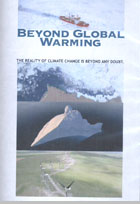
Beyond Global Warming 2008
Distributed by Landmark Media Inc., 3450 Slade Run Dr., Falls Church, VA 22042; 800-342-4336
Produced by Loic Guyot
Directed by Marc Tawil
DVD, color, 52 min.
College - Adult
Biology, Canadian Studies, Environmental Studies
Date Entered: 10/07/2010
Reviewed by Erin O'Toole, Science and Technology Librarian, University of North Texas, DentonBeyond Global Warming aims to explore the Canadian Arctic’s future now that climate change is a reality, but misses the mark. The film follows the multiple missions of the icebreaker, Canadian Coast Guard Ship (CCGS) Amundsen, a research vessel supported by the Canadian government. The researchers on the Amundsen represent 15 different countries and multiple scientific disciplines. The Canadian government hopes that their studies will help predict the emerging ecology in northern Canada and identify opportunities for economic development.
The narrative meanders from statistics that prove climate change is occurring in the Canadian Arctic (although the film’s topic is supposed to be “beyond global warming”), to the research activities on board the Amundsen, to predictions of new markets and industries in the North. It seems discordant and offensive when the narrator warns of the loss of Arctic mammals because of the melting ice pack, closely followed by an enthusiastic prediction that oil, gas, and other resources can be retrieved now that the ice is gone. Perhaps the director was trying to be unbiased about the consequences of climate change, but the resulting narrative is disturbing.
The majority of the footage in the film is of the CCGS Amundsen sailing through Hudson Bay, the Beaufort Sea, and the Northwest Passage, accompanied by the narrator’s voiceovers. While the scenery is breathtaking, the bird’s eye view of the ship gets dull. The monotony is occasionally broken by interviews with the scientists, Inuits, and the ship’s captain. The most interesting scenes are those of the scientists conducting their research with specialized technologies.
The film concludes with statements about Canada’s increasing global leadership role as industries develop in the Arctic and navigation through the Northwest Passage becomes possible. It is difficult to share the narrator’s excitement when the predicted “progress” is at the expense of one of the most intriguing and delicate ecological systems in the world.